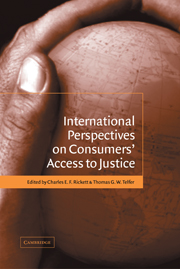Book contents
- Frontmatter
- Contents
- List of contributors
- Preface
- Table of cases
- Table of statutes
- 1 Consumers' access to justice: an introduction
- Part I Perspectives on consumers' access to justice
- Part II Issues in contract and tort
- 5 Standard form contracts in Europe and North America: one hundred years of unfair terms?
- 6 BSE, CJD, mass infections and the 3rd US Restatement
- Part III Services and the consumer
- Part IV Consumer bankruptcy law
- Part V Procedure and process issues
- Part VI Conflict of laws issues
- Index
6 - BSE, CJD, mass infections and the 3rd US Restatement
from Part II - Issues in contract and tort
Published online by Cambridge University Press: 11 July 2009
- Frontmatter
- Contents
- List of contributors
- Preface
- Table of cases
- Table of statutes
- 1 Consumers' access to justice: an introduction
- Part I Perspectives on consumers' access to justice
- Part II Issues in contract and tort
- 5 Standard form contracts in Europe and North America: one hundred years of unfair terms?
- 6 BSE, CJD, mass infections and the 3rd US Restatement
- Part III Services and the consumer
- Part IV Consumer bankruptcy law
- Part V Procedure and process issues
- Part VI Conflict of laws issues
- Index
Summary
Introduction
In 1993 when I was writing Product Liability I wanted an example of a risk that was almost unanimously regarded as negligible. I wanted to ask the question of whether a bizarrely remote suspected risk could deprive a defendant of the development risk defence in the 1985 European Directive on Product Liability. My choice has turned out to be an even better illustration of the problems I was highlighting than I imagined. I wrote:
Should those now supplying meat be held liable if eventually it is shown that the factor responsible for bovine spongiform encephalopathy (‘mad cow disease’) has been passed via that meat to humans to cause Creutzfeldt–Jakob disease – a risk which as yet is given little credence in scientific circles, but a risk for which the technical means of eventual detection do exist?
This article is one step in looking at the challenge that bovine spongiform encephalopathy (BSE), Creutzfeldt–Jakob disease (CJD) and other mass infections of product sectors throw out to the product liability regimes around the world. Certain characteristics make this challenge particularly severe. First, the dangerous infection is not part of the condition of the product which the supplier ‘intended’ in the sense of ‘desired’. Secondly, the dangerous infection is known or suspected to be ‘generic’, that is, potentially it has affected an entire product sector such as the beef industry or the blood product sector. Thirdly, this sector is an ‘essential’ product sector in that it does not have realistic substitutes.
- Type
- Chapter
- Information
- International Perspectives on Consumers' Access to Justice , pp. 128 - 146Publisher: Cambridge University PressPrint publication year: 2003



